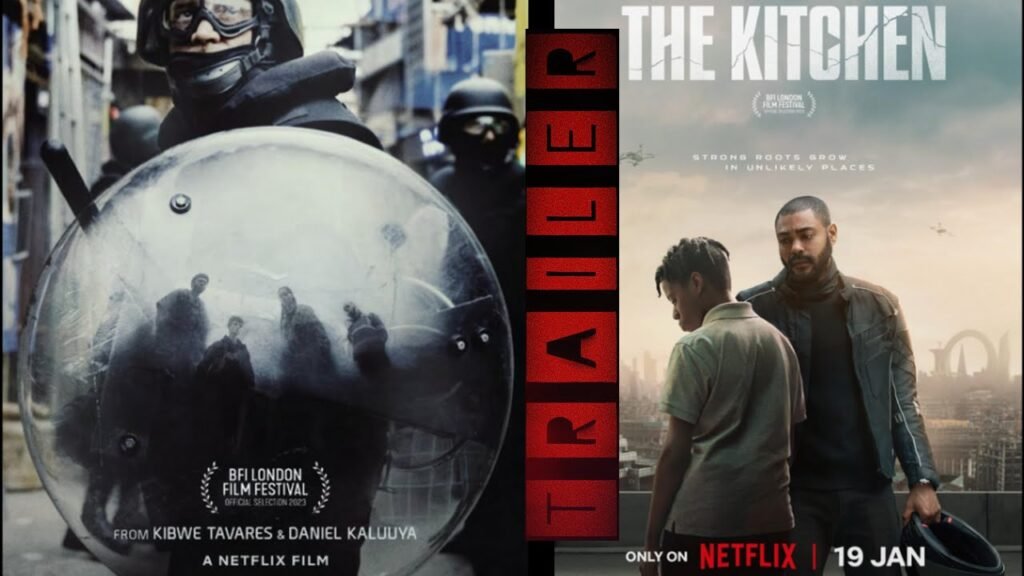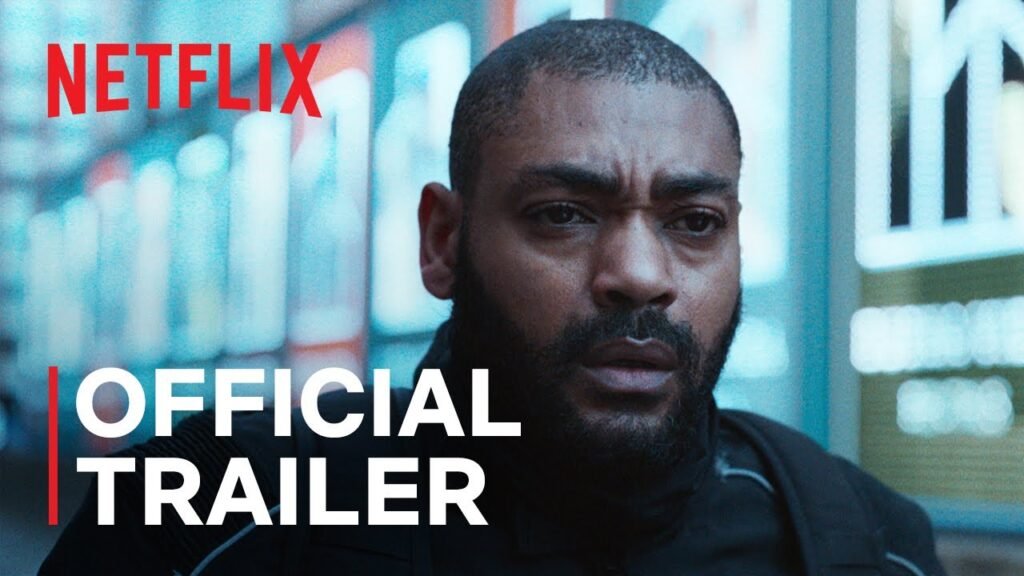The Kitchen : Introduction
In the ever-evolving landscape of streaming content, Netflix consistently pushes the boundaries of storytelling, offering viewers unique narratives that delve into the complexities of society. One highly anticipated upcoming release that promises to captivate audiences is “The Kitchen,” a dystopian saga set against the backdrop of a divided London, exploring themes of fatherhood and community resilience.
The Kitchen : Plot Overview
“The Kitchen” unfolds in a dystopian future where the socioeconomic gap has reached its zenith, leaving a fractured society struggling for survival. The narrative revolves around Izi and Benji, portrayed by the talented Kane Robinson and the promising newcomer Jedaiah Bannerman, respectively. As residents of The Kitchen, a community defiantly clinging to its existence in the face of adversity, Izi and Benji navigate a world where social housing has been eradicated.
Key Characters of The Kitchen :
Izi (Kane Robinson): At the core of the narrative, Izi embodies the resilience and determination of The Kitchen’s residents. Robinson’s portrayal promises to bring depth to the character, highlighting the challenges and sacrifices made in the pursuit of a better future.
Benji (Jedaiah Bannerman): As a newcomer to the acting scene, Bannerman’s introduction is eagerly anticipated. His character, Benji, adds a layer of innocence and curiosity to the story, offering a fresh perspective on the harsh realities of their dystopian world.
Hope Ikpoku Jnr (Character Name): While specific details about Hope Ikpoku Jnr’s character remain undisclosed, his inclusion adds an element of mystery to the narrative. Viewers can anticipate a performance contributing to the multifaceted nature of “The Kitchen.”
Behind The Scenes :
“The Kitchen” is not only a visual treat but also a testament to the creative prowess of its filmmakers. Daniel Kaluuya, known for his stellar on-screen performances, takes a step behind the camera as the director. Collaborating with visionary Kibwe Tavares, the duo promises a cinematic experience transcending conventional storytelling.
Furthermore, the writing team, consisting of Daniel Kaluuya and Joe Murtagh, ensures a narrative that is compelling and thought-provoking. With a keen focus on societal issues, the script explores the consequences of a world divided by wealth, offering viewers a mirror to reflect on the challenges faced by contemporary society.
Visual and Cinematic Elements :
“The Kitchen” is not just a narrative; it’s a visual symphony that utilizes the dystopian backdrop of London to craft a cinematic masterpiece. From the soaring skyscrapers of the affluent to the gritty alleyways of The Kitchen, the cinematography promises to be a feast for the eyes.
Director Daniel Kaluuya’s vision extends beyond the storyline, incorporating visual metaphors and symbolism that add layers to the overall viewing experience. The contrast between the opulence of the elite and the resilience of The Kitchen’s residents becomes a visual spectacle immersing the audience in the stark realities of this dystopian world.

Pic Courtesy / Credits – Netflix
The Kitchen : Exploring Fatherhood
At the heart of “The Kitchen” lies a profound exploration of fatherhood. Izi, portrayed by Kane Robinson, emerges as a central figure whose journey intertwines with the responsibilities of parenthood in a world where every choice has profound consequences.
The character dynamics between Izi and Benji provide a poignant lens through which the film examines the sacrifices fathers make for the well-being of their families. As The Kitchen becomes a battleground for survival, the narrative explores the lengths to which a father is willing to go to protect his loved ones.
Community Bonds and Resilience :
The community of The Kitchen serves as more than just a backdrop; it becomes a character in its own right. The resilience of the residents, their shared struggles, and the bonds forged in the crucible of adversity elevate “The Kitchen” beyond a mere dystopian tale.
The film paints a vivid picture of a community that refuses to abandon its home, even in the face of overwhelming odds. The themes of unity, solidarity, and the strength derived from communal bonds resonate with contemporary audiences, serving as a reflection of the collective resilience needed to overcome societal challenges.
The Impact of Social Housing Elimination:
“The Kitchen” takes a bold step in presenting a world where social housing has been eliminated. This choice serves as a stark commentary on real-world issues of wealth inequality and the consequences of policies disproportionately affecting marginalized communities.
The absence of social housing becomes a driving force behind the characters’ struggles, highlighting the importance of addressing systemic issues that impact the most vulnerable members of society. The film encourages viewers to reflect on the implications of such societal shifts and prompts a dialogue about the responsibility of communities and governments alike.
The Visionary Filmmakers :
Director Daniel Kaluuya and collaborator Kibwe Tavares bring a wealth of talent and perspective to “The Kitchen.” Kaluuya’s transition from celebrated actor to director adds a unique dimension to the film. Tavares, known for his innovative approach to storytelling, contributes a visionary touch that promises to make “The Kitchen” a cinematic experience like no other.
The collaboration between these two filmmakers suggests a synergy beyond conventional storytelling. Their shared vision for “The Kitchen” aligns with a commitment to pushing boundaries and challenging the norms of filmmaking, creating anticipation for a narrative that is both visually stunning and intellectually stimulating.
The Writing Prowess :
The script, penned by Daniel Kaluuya and Joe Murtagh, stands out as a testament to the writing prowess underlying “The Kitchen.” The narrative unfolds with a careful balance of tension, emotion, and thought-provoking moments that keep viewers engaged from start to finish.
Kaluuya and Murtagh delve into the complexities of a dystopian world with a narrative that goes beyond surface-level storytelling. The layers within the script provide ample opportunities for the cast to showcase their talents, ensuring that each character contributes meaningfully to the overarching themes of the film.
The Rising Star: Jedaiah Bannerman :
In the midst of seasoned actors, Jedaiah Bannerman emerges as the rising star of “The Kitchen.” As Benji, Bannerman brings a freshness and authenticity to the narrative. His portrayal of a character navigating the harsh realities of a dystopian world adds a layer of relatability, inviting audiences to invest emotionally in the unfolding story.
Bannerman’s inclusion in the cast reflects a commitment to introducing new voices to the cinematic landscape. His performance in “The Kitchen” serves as a promising debut, hinting at a career that holds the potential to contribute significantly to the world of film.
The Enigma of Hope Ikpoku Jnr :
While specific details about Hope Ikpoku Jnr’s character remain shrouded in mystery, his presence in “The Kitchen” adds an air of anticipation. Ikpoku Jnr’s reputation as an enigmatic actor suggests a character with depth and nuance, contributing to the intrigue that surrounds the film.
The deliberate choice to keep certain aspects of the narrative undisclosed generates curiosity among viewers. The enigma surrounding Hope Ikpoku Jnr’s character becomes an integral part of the film’s marketing strategy, inviting audiences to unravel the mysteries within “The Kitchen.”
Marketing and Anticipation :
Netflix’s marketing strategy for “The Kitchen” capitalizes on the film’s compelling narrative, visionary filmmakers, and a stellar cast. Trailers, teasers, and promotional materials tease the audience with glimpses of the dystopian world, promising an immersive experience that goes beyond conventional storytelling.
The strategic use of social media platforms, interviews with the cast and crew, and behind-the-scenes content contribute to building anticipation. Fan engagement is fostered through interactive campaigns, generating discussions around the themes presented in “The Kitchen” and fueling excitement leading up to the release.
The Social Commentary :
“The Kitchen” transcends the boundaries of entertainment, serving as a powerful tool for social commentary. The dystopian setting becomes a mirror reflecting the societal challenges of the present, urging viewers to contemplate the consequences of unchecked inequality and the importance of community resilience.
By tackling issues such as the elimination of social housing, the film prompts discussions on the responsibility of society and governments in addressing systemic disparities. “The Kitchen” becomes not only a cinematic experience but a catalyst for dialogue, encouraging viewers to engage with the broader societal issues presented in the narrative.
The Soundtrack and Atmosphere :
Complementing the visual spectacle, the soundtrack of “The Kitchen” adds another layer to the immersive experience. A carefully curated musical score enhances emotional beats, heightens tension, and underscores the film’s thematic elements.
The atmospheric elements, including sound design and cinematography, contribute to the overall ambiance. From the bustling streets of dystopian London to the quiet moments of introspection, every detail is crafted to draw the audience deeper into the world of “The Kitchen.”
Critical Acclaim and Awards Potential :
Given the caliber of talent involved in “The Kitchen,” anticipation for critical acclaim and potential awards recognition is high. The film’s exploration of societal issues, coupled with stellar performances and visionary direction, positions it as a strong contender for various accolades.
As critical reviews begin to surface, the film’s reception among audiences and critics alike will likely influence its trajectory during award seasons. “The Kitchen” has the potential not only to entertain but to leave a lasting impact on the cinematic landscape.
Cultural Relevance and Impact :
Beyond its entertainment value, “The Kitchen” holds cultural relevance by addressing pertinent societal issues. The film’s themes of wealth disparity, the consequences of policy decisions, and the strength derived from community bonds resonate with global audiences.
In an era where art often reflects and influences societal discourse, “The Kitchen” emerges as a piece of cultural commentary. Its impact extends beyond the confines of the screen, prompting conversations about the role of cinema in shaping perceptions and fostering empathy.
Fan Expectations and Theories :
As the release date approaches, fan expectations and theories surrounding “The Kitchen” gain momentum. Online forums buzz with discussions about the characters’ fates, potential plot twists, and the significance of certain visual cues in the trailers.
Fan-generated content, including fan art, speculation videos, and written theories, contributes to the pre-release excitement. The interactive relationship between filmmakers and fans on social media platforms further enhances the anticipation, creating a sense of community around the shared excitement for “The Kitchen.”
The Legacy of Dystopian Cinema :
“The Kitchen” joins the ranks of iconic dystopian films that have left a lasting legacy in cinematic history. From classics like “Blade Runner” to contemporary successes like “The Hunger Games,” dystopian narratives have resonated with audiences by offering thought-provoking reflections on societal structures and human nature.
“The Kitchen” stands poised to contribute to this rich tradition, bringing its own unique perspective to the genre. By building on the thematic foundations laid by its predecessors, the film has the potential to carve out its space in the pantheon of dystopian cinema.
Conclusion :
In conclusion, “The Kitchen” emerges as a cinematic tour de force, offering a compelling narrative set against the backdrop of a dystopian London. With its exploration of fatherhood, community bonds, and societal issues, the film transcends genre boundaries, promising an experience that resonates on multiple levels.
From the visionary direction of Daniel Kaluuya to the breakout performance of Jedaiah Bannerman, every element of “The Kitchen” contributes to its potential impact. As the film navigates the complexities of a divided society, it invites viewers on a journey that goes beyond entertainment, prompting reflection on the state of the world and the resilience of the human spirit.
As audiences eagerly await the release, the anticipation surrounding “The Kitchen” speaks to its cultural significance and the appetite for narratives that challenge, provoke thought, and leave a lasting imprint on the collective consciousness. Whether dissecting societal issues or immersing viewers in a visually stunning dystopian world, “The Kitchen” is poised to make waves in the world of streaming content and beyond.
We trust you found value in our in-depth content. Feel free to share your thoughts or feedback with us in the comment box below. We appreciate hearing from our readers! Explore more of our curated content and stay updated on the latest releases across all streaming platforms. Click here to immerse yourself in a world of entertainment





One Response